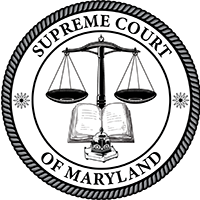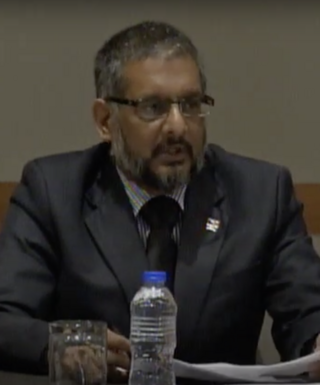While freedom of religion is de jure symbolically enshrined in the Malaysian Constitution, it de facto faces many prohibitions and restrictions. A Malay in Malaysia must strictly be a Muslim, and they cannot convert to another religion. Islamic religious practices are determined by official Sharia law, and Muslims can be fined by the state for not fasting or refusing to pray. The country does not consider itself a secular state and that Islam is the state religion of the country, and individuals with no religious affiliation are viewed with hostility.

The Supreme Court of India is the supreme judicial authority and the highest court of the Republic of India. It is the final court of appeal for all civil and criminal cases in India. It also has the power of judicial review. The Supreme Court, which consists of the Chief Justice of India and a maximum of fellow 33 judges, has extensive powers in the form of original, appellate and advisory jurisdictions.

The Supreme Court of Maryland is the highest court of the U.S. state of Maryland. The court, which is composed of one chief justice and six associate justices, meets in the Robert C. Murphy Courts of Appeal Building in the state capital, Annapolis. The term of the Court begins the second Monday of September. The Court is unique among American courts in that the justices wear red robes.

The Democratic Labour Party was the main opposition party in Trinidad and Tobago from 1957 till 1976. That party was the party which opposed the People's National Movement (PNM) at the time of Independence. After several splits brought about by leadership struggles, the party lost its hold on the Indo-Trinidadian community in the 1976 General Elections and was displaced in parliament by the United Labour Front under the leadership of Basdeo Panday, a former DLP senator. The party was the representative of the ethnic Indian community in the country; however Indian Muslims and Christians were said to be less loyal to the party than Indian Hindus.

The Trinity Cross was the highest of the National Awards of Trinidad and Tobago, between the years 1969 and 2008. It was awarded for: "distinguished and outstanding service to Trinidad and Tobago. It was awarded for gallantry in the face of the enemy, or for gallant conduct." Either nationals or non-nationals were awarded the honour, but no more than five may have been awarded in any year. The President was awarded the Trinity Cross in an ex officio capacity. The award was first presented in 1969, last conferred in 2005, and was subsequently replaced by The Order of the Republic of Trinidad and Tobago in the year 2008.
The National Awards of Trinidad and Tobago consist of:

The Caribbean Court of Justice is the judicial institution of the Caribbean Community (CARICOM). Established in 2005, it is based in Port of Spain, Trinidad and Tobago.
Religion in Trinidad and Tobago, which is a multi-religious country, is classifiable as follows:

In most legal jurisdictions, a supreme court, also known as a court of last resort, apex court, and highcourt of appeal, is the highest court within the hierarchy of courts. Broadly speaking, the decisions of a supreme court are not subject to further review by any other court. Supreme courts typically function primarily as appellate courts, hearing appeals from decisions of lower trial courts, or from intermediate-level appellate courts.
Inshan Ishmael came into the public eye with his launching of an Islamic television station in Trinidad and Tobago, the Islamic Broadcast Network, where he hosted a popular talk show, “Breaking Barriers” and for his historic court action against the state for using the Trinity Cross as the nation’s highest award. In January 2007 he again received national attention when he was arrested under the Anti-Terro.

Lesbian, gay, bisexual, and transgender (LGBT) people in Trinidad and Tobago face legal challenges not experienced by non-LGBT residents. Households headed by same-sex couples are not eligible for the same rights and benefits as that of opposite-sex couples.

The Mount Soledad Cross is a prominent landmark located on top of Mount Soledad in the La Jolla neighborhood of the city of San Diego, California. The present structure was erected in 1954; it is the third Christian cross in that location, the first having been put up in 1913. Architect Donald Campbell designed the present cross in prestressed concrete. It is 29 feet (8.8 m) tall with a 12-foot (3.7 m) arm spread. It is the centerpiece of the Mt. Soledad National Veterans Memorial.

Lesbian, gay, bisexual, and transgender (LGBT) people in Guyana face legal challenges not experienced by non-LGBT residents. Guyana is the only country in South America, and the only country in the Americas outside the Caribbean, where homosexual acts including anal sex and oral sex are still illegal. Recently, there have been efforts to decriminalize homosexual behaviours.

Devant Maharaj is a Trinidad and Tobago politician, and social activist. He is a leading member of the United National Congress. On 27 June 2011, he became a member of the Senate of the Republic of Trinidad and Tobago and Minister of Transport following his appointment as Chairman of the Public Services Transport Corporation of Trinidad and Tobago.

The Judiciary of Spain consists of Courts and Tribunals, composed of judges and magistrates (Justices), who have the power to administer justice in the name of the King of Spain.

Lesbian, gay, bisexual, and transgender (LGBT) persons in Belize face legal challenges not experienced by non-LGBT citizens, although attitudes have been changing in recent years. Same-sex sexual activity was decriminalized in Belize in 2016, when the Supreme Court declared Belize's anti-sodomy law unconstitutional. Belize's constitution prohibits discrimination on the basis of sex, which Belizean courts have interpreted to include sexual orientation.

The Judiciary of Barbados is an independent branch of the Barbadian government, subject only to the Barbadian Constitution. It is headed by the Chief Justice of Barbados. Barbados is a common law jurisdiction, in which precedents from English law and British Commonwealth tradition may be taken into account.

Elizabeth II was Queen of Trinidad and Tobago from the independence of Trinidad and Tobago on 31 August 1962 until the country became a republic on 1 August 1976. Her constitutional role as head of state was delegated to a governor-general, who acted on the advice of government ministers.
Jason Jones is a gay LGBTQI+ activist from Trinidad and Tobago who successfully challenged the constitutionality of Sections 13 and 16 of the Sexual Offenses Act prohibiting consensual adult intercourse per anum and sexual acts between consenting same-sex adults. In a landmark judgment in the English-speaking Caribbean, Justice Devindra Rampersad ruled the clauses unconstitutional and null and void.

The Supreme Court of Judicature for Trinidad and Tobago is the superior court for Trinidad and Tobago. It was established in accordance with the Constitution of Trinidad and Tobago and the Supreme Court of Judicature Act, 1962.












